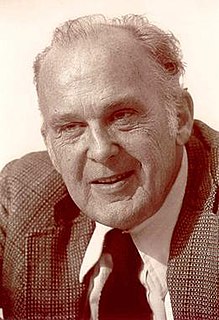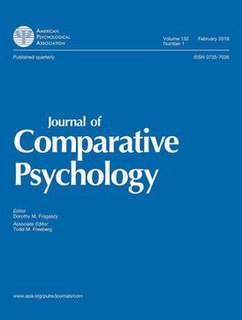
Evolutionary psychology is a theoretical approach in psychology that examines cognition and behavior from a modern evolutionary perspective. It seeks to identify which human psychological traits are evolved adaptations – that is, the functional products of natural selection or sexual selection in human evolution. Adaptationist thinking about physiological mechanisms, such as the heart, lungs, and immune system, is common in evolutionary biology. Some evolutionary psychologists apply the same thinking to psychology, arguing that the modularity of mind is similar to that of the body and with different modular adaptations serving different functions. These evolutionary psychologists argue that much of human behavior is the output of psychological adaptations that evolved to solve recurrent problems in human ancestral environments.

Psychology is the scientific study of mind and behavior. Psychology includes the study of conscious and unconscious phenomena, including feelings and thoughts. It is an academic discipline of immense scope, crossing the boundaries between the natural and social sciences. Psychologists seek an understanding of the emergent properties of brains, linking the discipline to neuroscience. As social scientists, psychologists aim to understand the behavior of individuals and groups. Ψ is a Greek letter which is commonly associated with the science of psychology.

Albert Bandura was a Canadian-American psychologist who was the David Starr Jordan Professor in Psychology at Stanford University.

David Cyril Geary is a United States cognitive developmental and evolutionary psychologist with interests in mathematical learning and sex differences. He is currently a Curators’ Professor and Thomas Jefferson Fellow in the Department of Psychological Sciences and Interdisciplinary Neuroscience Program at the University of Missouri in Columbia, Missouri.

The Association for Psychological Science (APS), previously the American Psychological Society, is an international non-profit organization whose mission is to promote, protect, and advance the interests of scientifically oriented psychology in research, application, teaching, and the improvement of human welfare. APS publishes several journals, holds an annual meeting, disseminates psychological science research findings to the general public, and works with policymakers to strengthen support for scientific psychology.
Delbert Duane Thiessen is an American psychology professor emeritus whose research focused on evolutionary mechanisms of reproduction and social communication. Del Wolf Thiessen, Ph.D., Born: August 13, 1932 Died:February 9, 2022 Professor Emeritus Psychology at University of Texas at Austin, Texas.

Donald Thomas Campbell was an American social scientist. He is noted for his work in methodology. He coined the term evolutionary epistemology and developed a selectionist theory of human creativity. A Review of General Psychology survey, published in 2002, ranked Campbell as the 33rd most cited psychologist of the 20th century.

Evolutionary developmental psychology (EDP) is a research paradigm that applies the basic principles of evolution by natural selection, to understand the development of human behavior and cognition. It involves the study of both the genetic and environmental mechanisms that underlie the development of social and cognitive competencies, as well as the epigenetic processes that adapt these competencies to local conditions.

Evolution and Human Behavior is a bimonthly peer-reviewed academic journal covering research in which evolutionary perspectives are brought to bear on the study of human behavior, ranging from evolutionary psychology to evolutionary anthropology and cultural evolution. It is primarily a scientific journal, but articles from scholars in the humanities are also published. Papers reporting on theoretical and empirical work on other species may be included if their relevance to the human animal is apparent. The journal was established in 1980, and beginning with Volume 18 in 1997 has been published by Elsevier on behalf of the Human Behavior and Evolution Society. The editor-in-chief is Debra Lieberman.

Roy F. Baumeister is an American social psychologist who is known for his work on the self, social rejection, belongingness, sexuality and sex differences, self-control, self-esteem, self-defeating behaviors, motivation, aggression, consciousness, and free will.

Evolutionary educational psychology is the study of the relation between inherent folk knowledge and abilities and accompanying inferential and attributional biases as these influence academic learning in evolutionarily novel cultural contexts, such as schools and the industrial workplace. The fundamental premises and principles of this discipline are presented below.

The Journal of Personality and Social Psychology is a monthly peer-reviewed scientific journal published by the American Psychological Association that was established in 1965. It covers the fields of social and personality psychology. The editors-in-chief are Shinobu Kitayama, Colin Wayne Leach, and Richard E. Lucas.

Nancy L. Segal is an American evolutionary psychologist and behavioral geneticist, specializing in the study of twins. She is the Professor of Developmental Psychology and Director of the Twin Studies Center, at California State University, Fullerton. Segal was a recipient of the 2005 James Shields Award for Lifetime Contributions to Twin Research from the Behavior Genetics Association and International Society for Twin Studies.
Mark Schaller is a psychological scientist who has made many contributions to the study of human psychology, particularly in areas of social cognition, stereotyping, evolutionary psychology, and cultural psychology. He is a Professor of Psychology at the University of British Columbia.

Steven L. Neuberg is an experimental social psychologist whose research has contributed to topics pertaining to person perception, impression formation, stereotyping, prejudice, self-fulfilling prophecies, stereotype threat, and prosocial behavior. His research can be broadly characterized as exploring the ways motives and goals shape social thought processes; extending this approach, his later work employs the adaptationist logic of evolutionary psychology to inform the study of social cognition and social behavior. Neuberg has published over sixty scholarly articles and chapters, and has co-authored a multi-edition social psychology textbook with his colleagues Douglas Kenrick and Robert Cialdini.

Psychology encompasses a vast domain, and includes many different approaches to the study of mental processes and behavior. Below are the major areas of inquiry that taken together constitute psychology. A comprehensive list of the sub-fields and areas within psychology can be found at the list of psychology topics and list of psychology disciplines.
The history of evolutionary psychology began with Charles Darwin, who said that humans have social instincts that evolved by natural selection. Darwin's work inspired later psychologists such as William James and Sigmund Freud but for most of the 20th century psychologists focused more on behaviorism and proximate explanations for human behavior. E. O. Wilson's landmark 1975 book, Sociobiology, synthesized recent theoretical advances in evolutionary theory to explain social behavior in animals, including humans. Jerome Barkow, Leda Cosmides and John Tooby popularized the term "evolutionary psychology" in their 1992 book The Adapted Mind: Evolutionary Psychology and The Generation of Culture. Like sociobiology before it, evolutionary psychology has been embroiled in controversy, but evolutionary psychologists see their field as gaining increased acceptance overall.

The Journal of Comparative Psychology is a peer-reviewed academic journal published by the American Psychological Association. It covers research from a comparative perspective on the behavior, cognition, perception, and social relationships of diverse species.
Todd Kennedy Shackelford is an American psychologist and professor at Oakland University. He is best known for his work in evolutionary psychology. He is the editor in chief of the academic journals Evolutionary Psychology and Evolutionary Psychological Science. He is a fellow of the American Psychological Association and the Association for Psychological Science.










